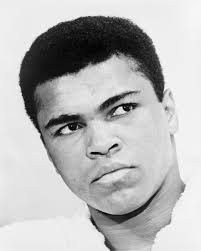 Muhammad Ali was, at his peak, arguably the most famous man on the planet.
Muhammad Ali was, at his peak, arguably the most famous man on the planet.
His prodigious boxing talent was matched only by a towering self-belief.
“I am the greatest,” he said, and who could doubt a man who won the World Heavyweight Championship three times.
His outspoken support for civil rights endeared him to millions of people across the world.
He was born Cassius Marcellus Clay in Louisville, Kentucky, on 17 January 1942, the son of a sign painter. He was named after a prominent 19th Century abolitionist.
When he was 12, he reported his bicycle had been stolen and told a police officer he was going to “whup” the culprit.
The officer, Joe Martin, trained young fighters at a local gym and suggested the youngster learn to box before he challenged the thief.
Clay quickly took to the ring, making his competitive debut in 1954 in a three-minute amateur bout.
“He stood out because he had more determination than most boys,” Martin later recalled. “He was easily the hardest worker of any kid I ever taught.”
Over the following five years, his amateur career flourished and he won a number of awards including the Golden Gloves Tournament of Champions in 1959.
In 1960 he was selected in the US team for the Rome Olympics. At first he refused to go because of his fear of flying. Eventually, according to Joe Martin’s son, he bought a second-hand parachute and wore it on the flight.
It was worth all the effort. On 5 September 1960, he beat Poland’s Zbigniew Pietrzykowski to become the Olympic light-heavyweight champion.
He received a hero’s welcome when the team returned to New York but the reality of the segregated US society hit home when he got back to Kentucky and was refused a table in a restaurant.
Ali claimed in his 1975 autobiography that he threw away his Olympic medal in disgust but it was later revealed that he lost it a year after his return from Rome.
Outrageous
Though only 18, he joined boxing’s paid ranks and began his professional career later the same year with a six-round points win over Tunney Hunsaker, a police chief from West Virginia.
“Clay was as fast as lightning,” Hunsaker said after the bout. “I tried every trick I knew to throw him off balance but he was just too good.”
Ali also took on Angelo Dundee, the trainer who would contribute so much to his boxing success.
A steady succession of victories, reinforced by outrageous self-advertising, brought him fame, if not universal popularity.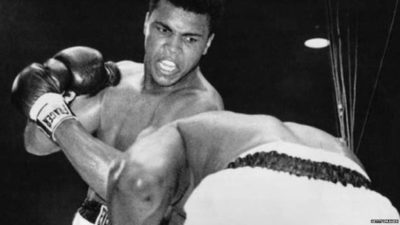
Clay’s extraordinary manner in the ring involved dancing around his opponents like a lightweight.
He taunted them, delighting crowds with his showboating, shuffling feet and lightning reflexes.
He offered further hostages to fortune by predicting not merely his opponents’ defeat, but when precisely he would dispose of them. “They must fall the round I call,” he boasted.
In London in 1963, he was floored in the fourth round by British champion Henry Cooper, but fulfilled his pre-fight prediction when cuts to Cooper’s eye forced his retirement in the next round.
Nation of Islam
The following year Clay challenged the formidable world champion Sonny Liston, whom he referred to as “that ugly old bear”.
Clay was given no chance by the boxing press but ran rings round his older opponent and forced Liston to quit on his stool at the end of the sixth round.
“I shook up the world,” a near-hysterical Clay declared after the fight.
Away from the ring, Clay was a fierce opponent of the racism that blighted large areas of the United States in the 1960s.
By the time of his first fight with Liston, Clay was already involved with the Nation of Islam, which called for separate black development.
The policy was in direct contrast to the inclusive approach favoured by civil rights leaders such as Martin Luther King.
The heavyweight champion of the world became Muhammad Ali. Cassius Clay, he said, was his “slave name”, and he took exception to anyone who continued to use it.
Ernie Terrell referred to Ali by his birth name during the build-up to their world championship fight in 1967, only for Ali to hand out a 15-round battering.
Jail sentence
At various points during the bout, Ali screamed in Terrell’s face: “What’s my name, Uncle Tom?”
Ali became a hate figure for sections of the American public and barely more than 2,000 people turned up to see his rematch with Liston, which he controversially won with a first-round knockout.
Eight more title defences followed but when Ali refused to sign the oath of allegiance to join the US Army (“I ain’t got no quarrel with them Vietcong”) , he was stripped of his title.
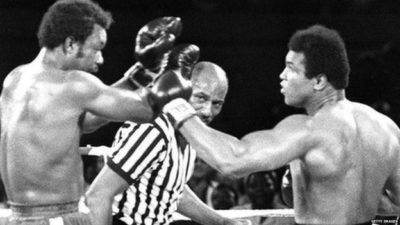
He was also given five years in jail, a sentence that was quashed on appeal.
After three years of growing anguish among Americans about the Vietnam War, Ali was granted a reprieve and returned to the ring in 1970 with a win over Jerry Quarry.
But his enforced absence had taken its toll on his speed, and in 1971 he was beaten for the first time in his professional career by Joe Frazier. Ali gained his revenge three years later.
Perhaps Ali’s greatest moment came in October 1974 when he defeated George Foreman in Zaire in the so-called Rumble in the Jungle.
Brutal
As with the first Liston fight, Ali was given little chance against the indomitable Foreman and some commentators even feared for his life.
With a frenzied crowd behind him, Ali spent most of the first eight rounds leaning back on the ropes, soaking up the punches of his younger, and significantly larger, foe.
He called the tactic “rope-a-dope”, and at the end of the eighth round he sprang out of his defensive shell and sent Foreman sprawling to the canvas with a picture-perfect combination.
At the age of 32, Ali had become only the second man in history to regain the heavyweight championship of the world.
A year later, Ali met Frazier for a third time in the so-called Thrilla in Manila, perhaps the most brutal encounter in heavyweight history.
Ali said it was the closest he had come to death in the ring, but he was victorious when Frazier’s corner halted the fight after 14 rounds.
Ali could, and perhaps should, have retired at that point, but he fought on.
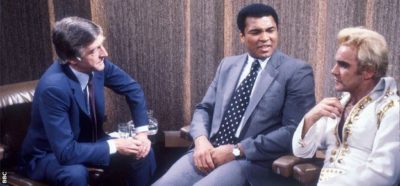
Fading force
In Las Vegas in February 1978, he lost his title to Leon Spinks, the 1976 Olympic light-heavyweight champion who was 12 years his junior.
The return fight in New Orleans eight months later drew a world record gate, with millions more watching on television.
This time Ali took a unanimous decision and won the world title for a third time at 36.
Generous with his money, Ali is thought to have earned more than $60m (£37.2m) from his ring career – but by 1979, he seemed to have little of it left.
That may be one of the reasons he refused to call time on his ring career, but he was clearly a fading force when he lost his title for the last time to former sparring partner Larry Holmes in Las Vegas in 1980.
Ali had one more fight, against Canadian Trevor Berbick in December 1981, and after losing on points he finally retired from the ring, at the age of 40.
Soon after, rumours began to circulate about the state of his health. His speech had become slurred, he shuffled and was often drowsy.
Exemplary services
Parkinson’s disease was eventually diagnosed, a condition only too obvious when, with courage and dignity, he lit the 1996 Olympic cauldron in Atlanta.
Rumours about Ali’s health periodically became a subject of heated discussions in the US and abroad.
But he continued to travel, receiving an ecstatic welcome wherever he appeared, especially in the developing world, where he was particularly revered.
The millennium celebrations saw Ali honoured around the globe.
In Britain, BBC viewers voted him Sports Personality of the Century, and he was given a similar award from Sports Illustrated in the US.
In 2005, Ali received America’s two highest civilian awards – the Presidential Citizens Medal and the Presidential Medal of Freedom – for “exemplary services” to the country.
The same year saw the opening of the non-profit Muhammad Ali Center in Louisville, Kentucky, which promotes peace, social responsibility and respect.
Muhammad Ali’s record as a boxer was impressive. The record books show that his professional career spanned 21 years, during which he won 56 fights, 37 by way of knockout, and lost five.
But he was much more than that. He was a great showman whose off-the-cuff quips and improvised poetry won him many friends, not least in the UK.
His high profile gave his espousal of civil rights additional weight and he was a hero to large numbers of black people both in the US and further afield.
And late in life, when this magnificent athlete was brought low by a debilitating disease, his quiet dignity impressed everyone he met.
Rarely has any person transcended his sport in the way Ali did, to become one of the best-known figures of his time.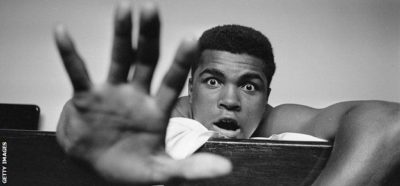


Be the first to comment